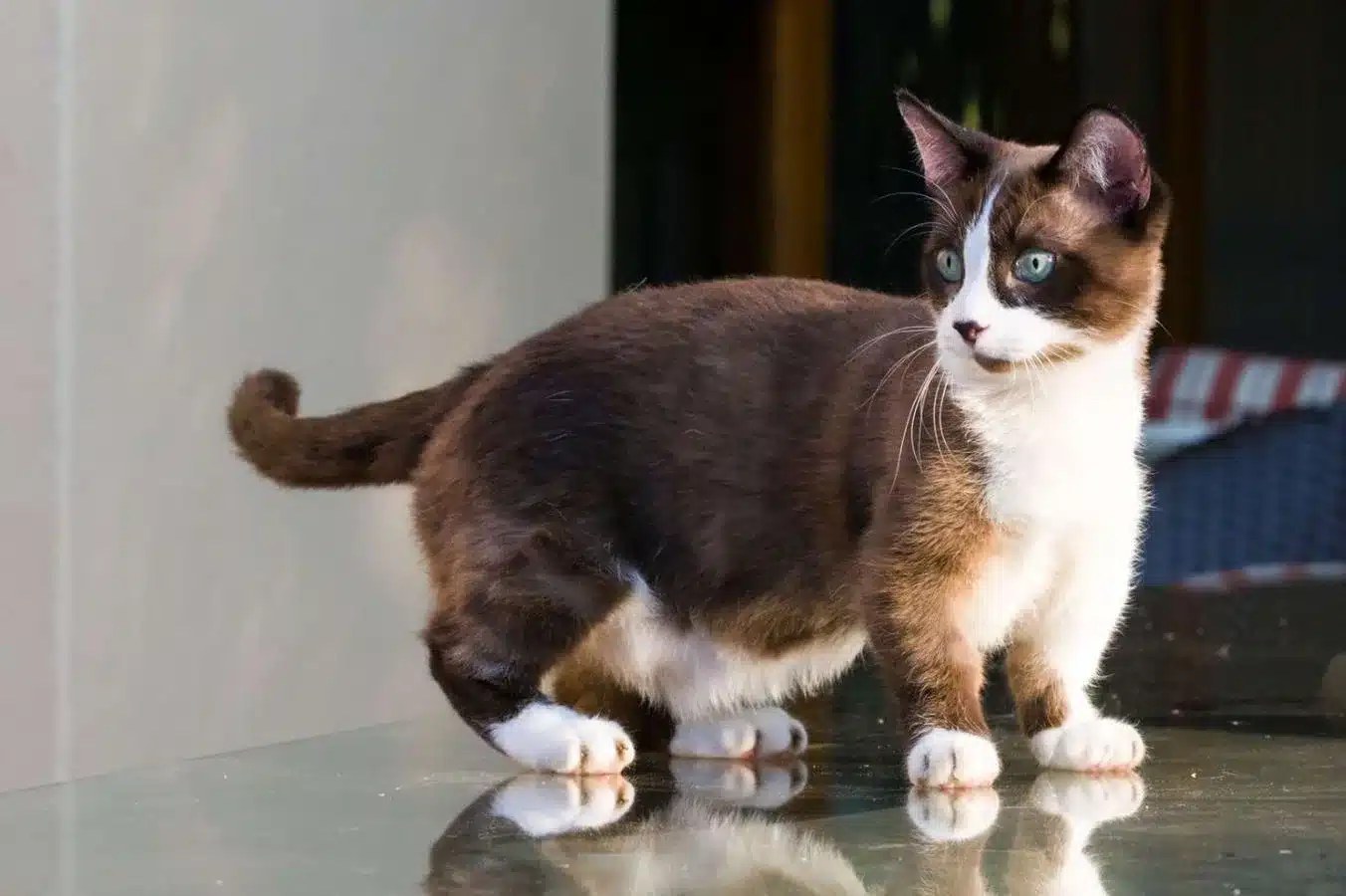10 Munchkin Cat Breed Health Problems & Solutions [2024]
Do you own a Munchkin cat or want to get one, but are concerned about the health problems? If yes, then you just have come to the right place. In this guide, we have described some of the common Munchkin Cat Breed Health Problems and the solutions related to these problems.
The Munchkin cat, known for its distinctively short legs and endearing appearance, captures the hearts of many cat enthusiasts. Despite its charming looks, the breed is often at the center of health-related discussions.
Munchkin cats, sometimes perceived as a feline form of dwarfism, exhibit a unique genetic trait leading to their shortened limb stature. This trait, while contributing to their popularity, raises concerns regarding their well-being and longevity.
Munchkin cats, characterized by their compact size and playful nature, have a controversial breeding history. Some argue that breeding for such physical traits can lead to health complications. However, Munchkin cats continue to be beloved by many, admired for their energetic and affectionate demeanor.
Munchkin Cat Breed Health Problems
1. Limb Deformity & Arthritis
Limb Deformity & Arthritis are some of the most common Munchkin Cat Breed Health Problems. Munchkin cats, with their notably short legs, often face musculoskeletal challenges.
The genetic mutation responsible for their stature predisposes them to limb deformities and subsequent arthritis. These conditions can lead to discomfort and reduced mobility as the cat ages.
-
- Regular veterinary check-ups to monitor joint health.
- Weight management to reduce strain on joints.
- Pain relief medications and anti-inflammatory drugs as prescribed by a vet.
2. Intervertebral Disc Disease (IVDD)
IVDD is a condition that can affect Munchkin cats due to their unique spinal structure. It involves the herniation or protrusion of discs in the spine, causing pain and potentially leading to severe neurological issues.
-
- Early diagnosis through regular veterinary examinations.
- Medications to manage pain and inflammation.
- Surgical intervention in severe cases to alleviate compression on the spinal cord.
3. Lordosis
Lordosis, an excessive inward curvature of the spine, is another health concern that can affect Munchkin cats. This condition can lead to discomfort and other complications due to abnormal spinal alignment. So, it’s one of the common Munchkin Cat Breed Health Problems.
-
- Monitoring and managing symptoms under veterinary guidance.
- Surgery in severe cases to correct the spinal curvature.
- Supportive care, including physical therapy and pain management.
4. Pectus Excavatum
Pectus excavatum is a chest deformity seen in some Munchkin cats, characterized by a sunken or concave chest appearance. This can impact respiratory and cardiac function.
-
- Surgical correction for severe cases to improve chest structure and function.
- Regular monitoring of respiratory and cardiac health by a veterinarian.
- Supportive care to manage symptoms and improve quality of life.
5. Diabetes
Diabetes is a significant health concern for many cat breeds, including Munchkin cats. This metabolic disorder affects the body’s ability to use glucose efficiently, leading to elevated blood sugar levels.
-
- Regular veterinary check-ups for early detection and management.
- Insulin therapy and monitoring blood sugar levels.
- Dietary adjustments to manage weight and blood sugar.
6. Hyperthyroidism
Hyperthyroidism, an overactive thyroid gland, is common in cats and can lead to a range of symptoms including weight loss and increased appetite. This can be one of the Munchkin Cat Breed Health Problems.
-
- Medication to regulate thyroid hormone levels.
- Regular monitoring of thyroid function and adjusting treatment as needed.
- In some cases, surgical removal of the thyroid gland or radioactive iodine therapy may be recommended.
7. Chronic Kidney Disease (CKD)
CKD is a prevalent issue in older cats, including Munchkins, where the kidneys lose their filtering ability over time. So, it’s one of the Munchkin Cat Breed Health Problems that you should know.
-
- Regular blood and urine tests to monitor kidney function.
- Specialized diets to reduce kidney workload.
- Medications to manage symptoms and slow disease progression.
8. Feline Lower Urinary Tract Disease (FLUTD)
FLUTD encompasses various conditions affecting the urinary bladder and urethra, leading to discomfort and potentially life-threatening blockages.
-
- Stress reduction and environmental enrichment.
- Dietary changes to promote urinary health and prevent crystal formation.
- Immediate veterinary care for urinary obstructions.
9. Heart Disease
Heart disease in cats can be either congenital or acquired, affecting their overall health and longevity.
-
- Regular veterinary evaluations to detect heart problems early.
- Medications to manage heart function and prevent progression.
- Lifestyle modifications, including diet and exercise, to support heart health.
10. Dental Disease
Dental issues are prevalent in cats and can lead to significant discomfort and systemic health problems if not addressed.
-
- Regular dental check-ups and cleanings by a veterinarian.
- Home dental care, including brushing the cat’s teeth.
- Dental diets and treats to help reduce plaque and tartar buildup.
Frequently Asked Questions (F.A.Q)
What is the average lifespan of a Munchkin cat?
Munchkin cats typically live between 12 and 15 years. Proper care, a healthy diet, and regular veterinary check-ups can influence their lifespan positively.
Are Munchkin cats more prone to health issues than other breeds?
Munchkin cats do have a predisposition to certain musculoskeletal issues due to their short legs, but with proper care, many live healthy, active lives. Like any breed, they can develop common feline diseases, so regular health monitoring is crucial.
Can the leg deformity in Munchkin cats be corrected?
The short stature of Munchkin cats is genetic and cannot be “corrected.” However, any resulting health issues, like arthritis, can be managed with veterinary care and lifestyle adjustments.
How can I tell if my Munchkin cat is experiencing health problems?
Signs of health issues in Munchkin cats include lethargy, reduced appetite, limping or difficulty moving, frequent urination or difficulty urinating, vomiting, diarrhea, and changes in behavior. Regular vet visits are essential for early detection and treatment of health problems.
What diet is best for a Munchkin cat?
A balanced, nutrient-rich diet suitable for their age, weight, and health status is recommended. Consult with a veterinarian to determine the best diet plan for your Munchkin cat, especially to manage or prevent specific health issues.
Wrapping Up
Munchkin cats, with their distinctive short legs and playful personalities, have won the hearts of many. While their unique physique may predispose them to certain health issues, understanding these potential problems allows for better care and management. Regular veterinary check-ups, a balanced diet, and a nurturing environment are key to ensuring these charming felines lead a long, healthy, and happy life. By staying informed and proactive about their health needs, Munchkin cat owners can enjoy the delightful companionship of these quirky and affectionate pets for years to come.


![Are Money Trees Toxic to Cats? – Everything You Need to Know [2024]](https://catscuddle.com/wp-content/uploads/2024/03/Are-money-trees-toxic-to-cats-768x432.webp)
